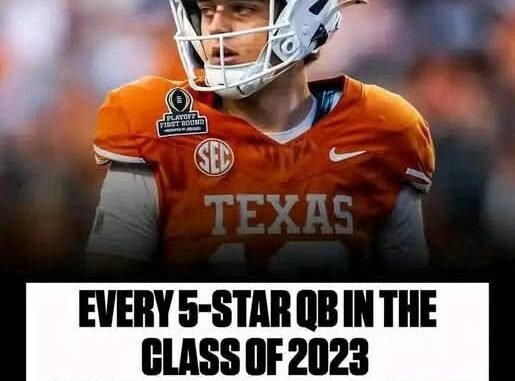
Arch Manning Stands Alone: The Lone 5-Star Quarterback Remaining in the 2023 Class, a Testament to Texas Longhorns’ Recruitment Prowess and a Striking Commentary on the Shifting Sands of College Football
AUSTIN, TX – In a stunning turn of events that has reshaped the landscape of college football, all but one of the five-star quarterbacks from the highly touted 2023 recruiting class have transferred to new institutions. Arch Manning, the highly-regarded nephew of Peyton and Eli Manning, remains the sole exception, a testament to the persuasive power of the Texas Longhorns’ recruitment strategy and a compelling indicator of the increasingly volatile nature of collegiate athletics. This unprecedented exodus of top-tier talent underscores the shifting dynamics within the college football landscape, fueled by the impact of NIL deals, evolving coaching strategies, and the ever-present allure of immediate playing time.
The 2023 quarterback class, initially heralded as one of the most exceptional in recent memory, boasted a wealth of five-star talent. These young quarterbacks, each with exceptional potential, were heavily courted by numerous high-profile programs across the nation. The initial commitment choices sparked a flurry of media speculation and excitement amongst fans and analysts alike. However, the subsequent wave of transfers has dramatically altered the initial perception of the class, leaving Arch Manning as the only remaining five-star quarterback in his original landing spot.
The reasons behind this remarkable exodus are multifaceted. The introduction of Name, Image, and Likeness (NIL) deals has undeniably played a significant role. These deals, allowing college athletes to profit from their endorsements and sponsorships, have created a new dynamic in recruiting, with substantial financial incentives often swaying athletes’ decisions. The lure of lucrative contracts, coupled with the potential for earlier professional prospects, has prompted some quarterbacks to seek opportunities offering more immediate financial rewards.
Another contributing factor is the ever-changing nature of coaching staffs. Coaching changes are commonplace in college football, and the departure of a head coach or offensive coordinator can drastically alter an athlete’s perspective on their future prospects. The promise of a new offensive scheme, a different coaching style, or simply a change of environment can influence a quarterback’s decision to transfer.
The quest for immediate playing time has also played a pivotal role. Five-star recruits often face intense competition, especially at the quarterback position, which can lead them to seek schools where they’re guaranteed a starting role. The desire for consistent game experience, crucial for development and future NFL aspirations, often outweighs other considerations for these young athletes.
The retention of Arch Manning by the University of Texas stands in stark contrast to the trends witnessed across the rest of the 2023 five-star quarterback class. This feat reflects the compelling combination of factors that attracted Manning to Texas, including a strong coaching staff, a well-structured development plan, and an environment fostering both athletic and personal growth.
Manning’s decision also underscores the importance of sustained recruitment strategies. The Longhorns clearly invested significant time and effort in cultivating a relationship with Manning, building trust and highlighting the program’s long-term vision. Their success in securing Manning’s commitment, and subsequently retaining him amidst the rampant transfer activity, signals the effectiveness of their holistic approach to recruiting.
The remaining five-star quarterback’s transfer activities raise questions regarding the long-term implications of NIL deals on the stability of college football programs. Will this trend continue, leading to increased volatility and a heightened emphasis on short-term gains over long-term development? The answer remains elusive, and the future trajectory of college athletics will undoubtedly be influenced by these unfolding dynamics.
The situation with Arch Manning, however, offers a beacon of hope, suggesting that strong coaching, a well-defined developmental pathway, and a robust program culture can still compete against the potent allure of significant financial incentives and the immediate gratification of guaranteed playing time. Manning’s continued presence in Austin offers a compelling counterpoint to the ongoing narrative of mass transfers, underscoring the importance of creating a holistic and supportive environment that nurtures athletes both on and off the field. His choice underscores a more nuanced approach to collegiate commitment, prioritizing long-term growth and development over immediate financial gains. Arch Manning’s decision will undoubtedly be studied by recruiters and athletes alike, providing a valuable case study in navigating the increasingly complex landscape of modern college football.
Leave a Reply